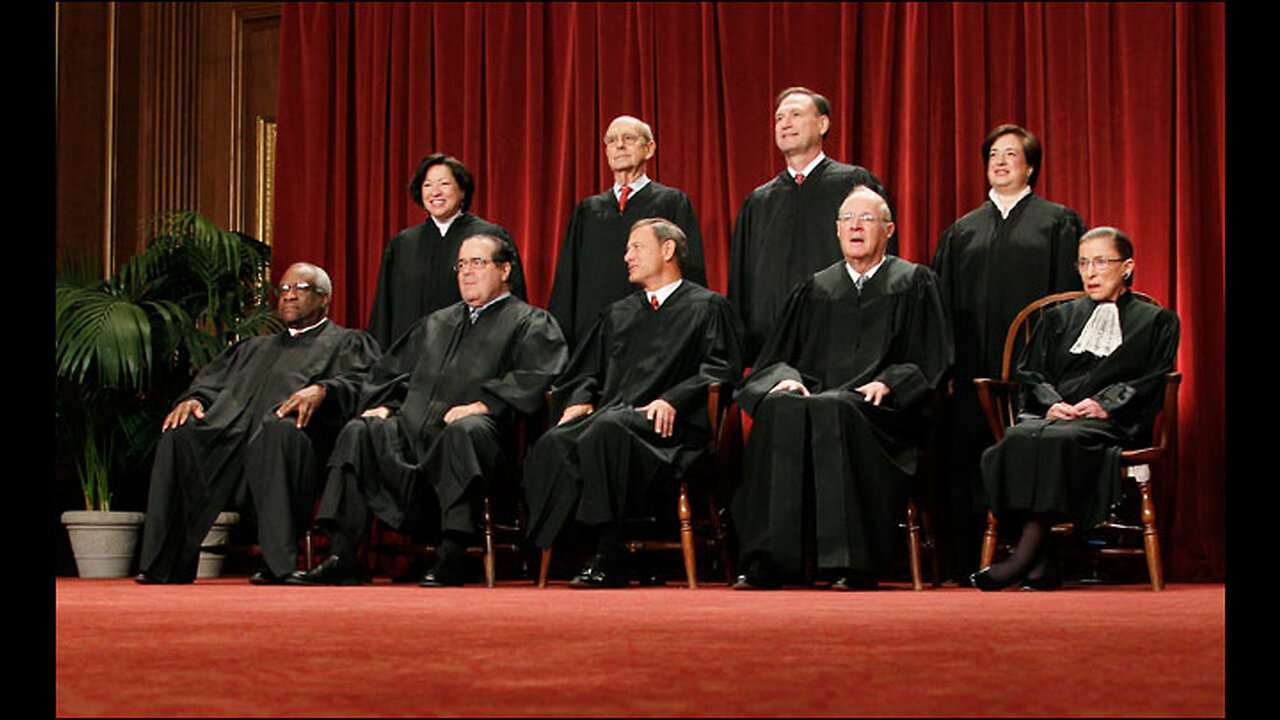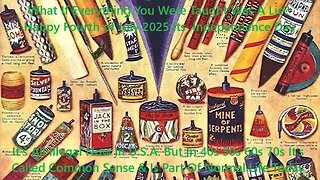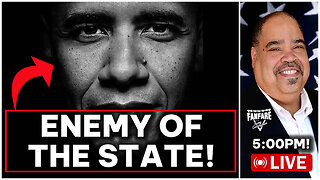Premium Only Content

Statutes and Codes Are Not Law Corporate Policy Right to Travel and Privileges !
Statutes are laws enacted by a legislative body. Statutes may also authorize administrative regulations and can overturn or modify court decisions that are sometimes concerned with statutory interpretation. In the United States, both the U.S. Congress and individual state legislatures have the power to pass statutes.
Remember: not all legal issues are governed by statute. Part of statutory research is determining whether or not a statute applies to a particular question or area of law.
RIGHT TO TRAVEL: STATUTES, CODES & REGULATIONS ARE NOT LAW
Any Color of Law “Law,” Statute, Code or Regulation that violates my fundamental and Constitutionally-protected rights is null and void as defined in countless Supreme Court cases, Washington Sessions Laws, Transportation Codes, and the Revised Code of Washington itself.
Consider yourself duly notified. Ignore this information at your and the “state’s” detriment.
RCW 46.25.050
Commercial driver's license required—Exceptions, restrictions, reciprocity.
(1) Drivers of commercial motor vehicles must obtain a commercial driver's license as required under this chapter. Except when driving under a commercial learner's permit and a valid driver's license and accompanied by the holder of a commercial driver's license valid for the vehicle being driven, no person may drive a commercial motor vehicle unless the person holds and is in immediate possession of a commercial driver's license and applicable endorsements valid for the vehicle they are driving. However, this requirement does not apply to any person:
(a) Who is the operator of a farm vehicle, and the vehicle is:
(i) Controlled and operated by a farmer;
(ii) Used to transport either agricultural products, which in this section include Christmas trees and wood products harvested from private tree farms and transported by vehicles weighing no more than forty thousand pounds licensed gross vehicle weight, farm machinery, farm supplies, animal manure, animal manure compost, or any combination of those materials to or from a farm;
(iii) Not used in the operations of a common or contract motor carrier; and
(iv) Used within one hundred fifty miles of the person's farm; or
(b) Who is a firefighter or law enforcement officer operating emergency equipment, and:
(i) The firefighter or law enforcement officer has successfully completed a driver training course approved by the director; and
(ii) The firefighter or law enforcement officer carries a certificate attesting to the successful completion of the approved training course; or
(c) [[However, this requirement does not apply to any person:]] Who is operating a recreational vehicle [*see below definition] for noncommercial purposes. As used in this section, "recreational vehicle" includes a vehicle towing a horse trailer for a noncommercial purpose….
[ 2013 c 224 § 4; 2011 c 142 § 1; 2006 c 327 § 3; 1995 c 393 § 1; 1990 c 56 § 1; 1989 c 178 § 7.]
WAC 308-100-210
*Recreational vehicle—Definition.
For the purposes of RCW 46.25.050 (1)(c), the term "recreational vehicle" shall include vehicles used exclusively for noncommercial purposes which are:
(1) Primarily designed for recreational, camping, or travel use;
(2) Towing a horse trailer; or
(3) Rental trucks having no more than two axles (one steering and one drive axle) used strictly and exclusively to transport personal possessions.
[Statutory Authority: RCW 46.01.110 and 46.25.140. WSR 90-17-028, § 308-100-210, filed 8/8/90, effective 9/8/90.]
IN A NUTSHELL, THIS IS THE TRUTH FROM THE RCW ITSELF:
RCW 46.25.050(1) Drivers of Commercial motor vehicles shall obtain a “commercial drivers license” as required under this chapter by April 1992…,
HOWEVER, this requirement does not apply to any person: (c) Who is operating a recreational vehicle for non-commercial purposes…
IT IS AN UNDISPUTED FACT OF LAW that RCW 46.25.080 is the one (1) and only license classification statute in title 46 of the motor vehicle code for the State of Washington and it is also undisputed that all three classes of licenses issued under this statute (Class A, Class B & Class C) are ALL COMMERCIAL DRIVERS LICENSES. SEE RCW 46.25.080 TO WIT: “RCW 46.25.080 License contents, classifications, endorsements, restrictions, expiration —Exchange of information. (1) The commercial driver’s license must be marked “commercial driver’s license” or “CDL,”…
Licenses may be classified as follows: (I) Class A …
(ii) Class B …
(iii) Class C
Please note that the older Washington Drivers licenses used to say “COMMERCIAL CLASSES” on the back side of the drivers license and in the left hand column of the back side of the drivers license, it used to say “Class A, Class B, Class C.” The Department of licensing has committed fraud against the Citizens of Washington and has removed the COMMERCIAL CLASSES designation from the back of the drivers license. All that remains of this truth on the drivers license is “CDL END” (Commercial Drivers License Endorsement) in very small print in the upper left hand corner of the front of the new drivers license.
U.S. SUPREME COURT AND OTHER HIGH COURT CITATIONS PROVING THAT NO LICENSE IS NECESSARY FOR NORMAL USE OF AN AUTOMOBILE ON COMMON WAYS The right of a citizen to travel upon the public highways and to transport his property thereon, by horsedrawn carriage, wagon, or automobile, is not a mere privilege which may be permitted or prohibited at will, but a common right which he has under his right to life, liberty and the pursuit of happiness. Under this constitutional guaranty one may, therefore, under normal conditions, travel at his inclination along the public highways or in public places, and while conducting himself in an orderly and decent manner, neither interfering with nor disturbing another’s rights, he will be protected, not only in his person, but in his safe conduct.
Thompson v.Smith, 154 SE 579, 11 American Jurisprudence, Constitutional Law, section 329, page 1135 “The right of the Citizen to travel upon the public highways and to transport his property thereon, in the ordinary course of life and business, is a common right which he has under the right to enjoy life and liberty, to acquire and possess property, and to pursue happiness and safety. It includes the right, in so doing, to use the ordinary and usual conveyances of the day, and under the existing modes of travel, includes the right to drive a horse drawn carriage or wagon thereon or to operate an automobile thereon, for the usual and ordinary purpose of life and business.” –
Thompson vs. Smith, supra.; Teche Lines vs. Danforth, Miss., 12 S.2d 784 “… the right of the citizen to drive on a public street with freedom from police interference… is a fundamental constitutional right” -White, 97 Cal.App.3d.141, 158 Cal.Rptr. 562, 566-67 (1979) “citizens have a right to drive upon the public streets of the District of Columbia or any other city absent a constitutionally sound reason for limiting their access.”
Caneisha Mills v. D.C. 2009 “The use of the automobile as a necessary adjunct to the earning of a livelihood in modern life requires us in the interest of realism to conclude that the RIGHT to use an automobile on the public highways partakes of the nature of a liberty within the meaning of the Constitutional guarantees. . .”
Berberian v. Lussier (1958) 139 A2d 869, 872, See also: Schecter v. Killingsworth, 380 P.2d 136, 140; 93 Ariz. 273 (1963). “The right to operate a motor vehicle [an automobile] upon the public streets and highways is not a mere privilege. It is a right of liberty, the enjoyment of which is protected by the guarantees of the federal and state constitutions.”
Adams v. City of Pocatello, 416 P.2d 46, 48; 91 Idaho 99 (1966). “A traveler has an equal right to employ an automobile as a means of transportation and to occupy the public highways with other vehicles in common use.”
Campbell v. Walker, 78 Atl. 601, 603, 2 Boyce (Del.) 41. “The owner of an automobile has the same right as the owner of other vehicles to use the highway,* * * A traveler on foot has the same right to the use of the public highways as an automobile or any other vehicle.”
Simeone v. Lindsay, 65 Atl. 778, 779; Hannigan v. Wright, 63 Atl. 234, 236. “The RIGHT of the citizen to DRIVE on the public street with freedom from police interference, unless he is engaged in suspicious conduct associated in some manner with criminality is a FUNDAMENTAL CONSTITUTIONAL RIGHT which must be protected by the courts.” People v. Horton 14 Cal. App. 3rd 667 (1971) “The right to make use of an automobile as a vehicle of travel long the highways of the state, is no longer an open question. The owners thereof have the same rights in the roads and streets as the drivers of horses or those riding a bicycle or traveling in some other vehicle.”
House v. Cramer, 112 N.W. 3; 134 Iowa 374; Farnsworth v. Tampa Electric Co. 57 So. 233, 237, 62 Fla. 166. “The automobile may be used with safety to others users of the highway, and in its proper use upon the highways there is an equal right with the users of other vehicles properly upon the highways. The law recognizes such right of use upon general principles.
Brinkman v Pacholike, 84 N.E. 762, 764, 41 Ind. App. 662, 666. “The law does not denounce motor carriages, as such, on public ways. They have an equal right with other vehicles in common use to occupy the streets and roads. It is improper to say that the driver of the horse has rights in the roads superior to the driver of the automobile. Both have the right to use the easement.”
Indiana Springs Co. v. Brown, 165 Ind. 465, 468. U.S. Supreme Court says No License Necessary To Drive Automobile On Public Highways/Streets No License Is Necessary Copy and Share Freely YHVH.name 2 2 “A highway is a public way open and free to any one who has occasion to pass along it on foot or with any kind of vehicle.” Schlesinger v. City of Atlanta, 129 S.E. 861, 867, 161 Ga. 148, 159;
Holland v. Shackelford, 137 S.E. 2d 298, 304, 220 Ga. 104; Stavola v. Palmer, 73 A.2d 831, 838, 136 Conn. 670 “There can be no question of the right of automobile owners to occupy and use the public streets of cities, or highways in the rural districts.” Liebrecht v. Crandall, 126 N.W. 69, 110 Minn. 454, 456 “The word ‘automobile’ connotes a pleasure vehicle designed for the transportation of persons on highways.”
-American Mutual Liability Ins. Co., vs. Chaput, 60 A.2d 118, 120; 95 NH 200 Motor Vehicle: 18 USC Part 1 Chapter 2 section 31 definitions: “(6) Motor vehicle. – The term “motor vehicle” means every description of carriage or other contrivance propelled or drawn by mechanical power and used for commercial purposes on the highways…” 10) The term “used for commercial purposes” means the carriage of persons or property for any fare, fee, rate, charge or other consideration, or directly or indirectly in connection with any business, or other undertaking intended for profit. “A motor vehicle or automobile for hire is a motor vehicle, other than an automobile stage, used for the transportation of persons for which remuneration is received.”
-
 1:01:18
1:01:18
What If Everything You Were Taught Was A Lie?
16 days agoIt's All Illegal Now In U.S.A. But In 40s 50s 60s It's Called Common Sense & Is Part Of Normal Life
2.18K4 -
 12:14:58
12:14:58
Spartan
15 hours agoSpartan - Pro Halo Player for OMiT | Scrims vs C9 then ranked
57.6K6 -
 2:16:19
2:16:19
vivafrei
18 hours agoEp. 273: Russia Hoax CONFIRMED! Will ARRESTS Follow? Trump SUES WSJ! Epstein Docs Release? & MORE!
151K165 -
 4:15:15
4:15:15
EricJohnPizzaArtist
6 days agoAwesome Sauce PIZZA ART LIVE Ep. #55: Wendy Wild!
52.1K2 -
 11:54
11:54
Tundra Tactical
11 hours ago $7.36 earnedIf You Laugh at These Gun Memes, the ATF Gets Your Dog – Tundy Meme Review
64.6K2 -
 4:08:53
4:08:53
Cewpins
8 hours agoSunday Sesh🍃weed💨420🔥!Giveaway !mj
24K11 -
 2:05:32
2:05:32
Nerdrotic
10 hours ago $3.72 earnedForbidden Inventions and Shadow Cover-ups | Forbidden Frontier #109
47.9K6 -
 2:57:01
2:57:01
JahBlessGames
7 hours ago🎉THPS w/ Cheap | Variety Ting | Music too??
10.1K1 -
 3:21:46
3:21:46
Barry Cunningham
17 hours agoPRESIDENT TRUMP HAS EXPOSED BARACK OBAMA AS A TRAITOR! AND MORE NEWS!
60.7K123 -
 2:19:12
2:19:12
THOUGHTCAST With Jeff D.
7 hours ago $0.05 earnedLATE NIGHT FORTNITE. Game & News Chat with Jeff D.
5.17K